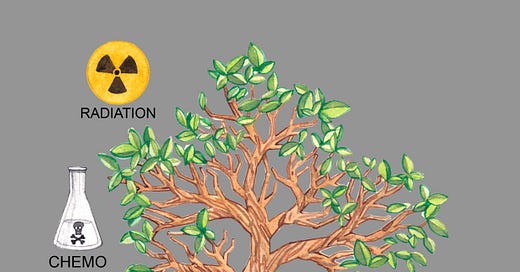When Ivermectin & Fenbendazole Aren't Enough - Part II
Dr. Marik's Game Changer in Targeting Cancer Stem Cells
Cancer stem cells are a major cause of cancer recurrence and spread. Cancer spread through microscopic remnants - termed CSCs or cancer stem cells - is not effectively addressed by chemotherapy, radiation, or surgery.
While surgery may remove macroscopic - or visible - portions of the tumor, it does nothing to target microscopic cancer stem cells. Worse, surgery stimulates these CSCs.
Radiation and chemotherapy also stimulate CSCs. I refer to CSCs as the “roots of cancer.” Cutting or poisoning the visible portions of the tree, such as the limbs and trunk often stimulates the roots to regrow the tree, and this is precisely what we notice in terminal cancers.
A repurposed drug like Ivermectin targets cancer stem cells through different pathways, and that is one reason it is so effective in late-stage cancers. Surprisingly Fenbendazole does not have as major an effect against CSCs, but it more than makes up for this by interfering with cancer’s metabolism and by stimulating P53 activity.
Here is what AI says about the relative effect of Ivermectin versus Mebendazole [chemically similar to Fenbendazole]:
Although Ivermectin and Fenbendazole are powerful anti-cancer drugs, one can increase one’s chances of success by targeting more CSC pathways.
However, as Dr. Paul Marik points out in his book, Cancer Care, there are many supplements that can be added to target CSCs including green tea, curcumin, and various vitamins. Here is an excerpt:
“Adding repurposed drugs to attack CSC should be a priority and should be done at the time of initiation of chemotherapy and radiation therapy. (13) Common repurposed drugs that can attack CSC include:
green tea extract,
melatonin,
vitamin D3,
metformin,
curcumin,
statins (atorvastatin),
berberine,
mebendazole,
doxycycline,
ivermectin,
resveratrol,
aspirin,
diclofenac phosphodiesterase 5-inhibitors, and
omega-3 fatty acids. "
In my book Surviving Cancer COVID-19 & Disease: The Repurposed Drug Revolution, I highlight the anti-cancer clinical effect of Metformin and, notably, its effect against CSCs.
In discussing this today with Dr. Marik, we reviewed some literature concerning Doxycycline which has strong anti-CSC activity.
Recently, I published a Substack concerning low-dose Doxycycline and its effect against viruses and bioweapon attacks, aka gain-of-function microbes. However, Doxycycline has powerful activity against cancer cell mitochondria, and this helps it reduce CSC populations. Because only small doses, such as 40 mg per day, are necessary, it does not harm the beneficial gut bacteria or cause drug resistance.
Moreover, when combined with tiny doses of Azithromycin and Vitamin C, reductions of CSC by 90% are documented.
Dr. Marik noted a similar study that found a 90% reduction in the CSC population by using only Doxycycline and combining it with Vitamin C.
Dr. Marik found what he calls a “game changer” with regard to oral Vitamin C when combined with Doxycycline. Here is why:
Keep reading with a 7-day free trial
Subscribe to Repurposed Drugs: Powers & Possibilities to keep reading this post and get 7 days of free access to the full post archives.







